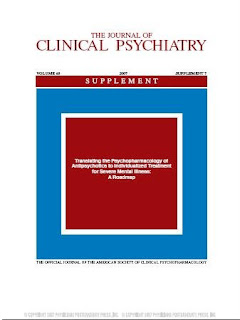 I just received the latest Supplement of the Journal of Clinical Psychiatry.
I just received the latest Supplement of the Journal of Clinical Psychiatry.The Journal of Clinical Psychiatry, which is published by Physicians Postgraduate Press, Inc., and is edited by Alan J.
Gelenberg, has developed a reputation for publishing CME supplements which are biased in favor of the sponsoring drug company.
Thus, the current supplement, paid for by Bristol-Myers Squibb, reads like an advertisement for Abilify.
The supplement is titled "Translating the Psychopharmacology of Antipsychotics to Individualized Treatment for Severe Mental Illness: A Roadmap." Sounds promising to me, though rather vague.
The issue is billed as being the result of an "Expert Consensus Survey." This means that BMS paid a third party for-profit company, Comprehensive Neuroscience, Inc., to cherry-pick experts and to send them a list of questions about their favorite antipsychotics in various clinical situations. The responses were tabulated into a series of charts that form the backbone of this supplement.
To understand why BMS would choose this method of CME promotion, you have to understand the context. Their antipsychotic, Abilify (aripiprazole), was not included in the influential CATIE trial, because it was approved after the trial was completed. Thus, while Eli Lilly (Zyprexa), AstraZeneca (Seroquel), and Pfizer (Geodon) have been able to tweak CATIE results to their advantage, Abilify has little in the way of head-to-head science to back up claims of advantage over competitors. Commissioning an "Expert Survey" allows BMS to round up key opinion leaders who they already know have positive opinions about Abilify, choose questions about topics that will tend to play up Abilify's advantages, and then publish the pre-planned answers.
Let's look at the results of this novel form of drug comparison research.
The supplement highlights the results of 17 questions. Eight of these were questions about general strategies, and nine were quite specific, asking which of a list of specific antipsychotics the experts would favor in given situations. How do the experts rank Abilify in these nine questions comparing it with its direct competitors?
--In seven of these comparisons, Abilify is ranked number one (see page 30 of the supplement).
--In one comparison, Abilify is ranked number two (page 21).
--In one comparison, Abilify is ranked number three (page 26).
Oddly enough, Zyprexa was at the bottom or near the bottom in all of these rankings, even though some of these same experts have written elsewhere that Zyprexa was the most effective of all newer atypicals in the CATIE trial.
Why did Abilify come out on top? Because of the types of questions these experts were asked. Most questions asked which antipsychotic the experts would choose in patients who were overweight, had cardiac disease, or who had diabetes. This is a great way to stack the deck in favor of Abilify.
The expert panel's rankings would surely have been in favor of Zyprexa if they had been asked to choose an antipsychotic based on efficacy alone. Abilify would have ranked very low indeed if they had been asked to choose a treatment for patients who suffered insomnia, anxiety, or agitation. These are all important clinical questions in the field, but were not asked because the answers would not have promoted Abilify.
Shame on Journal of Clinical Psychiatry for publishing such pseudoscience.


 Subscribe to our RSS Feed!
Subscribe to our RSS Feed!

8 comments:
good catch danny.
at a max security forensic hospital. We tried Abilify and had a big increase in violence -- the Abilify rep was certain it wasn't the drug. Of course, once we stopped Abilify, the violence went way down.
Steve: Yes, and if the expert panel had been asked about their first choice antipsychotic for a violent patient, you can bet Abilify would have been at the bottom of the rankings.
While I agree that JCP has a somewhat dubious reputation, BMS is simply showcasing the drug's strengths and helping to highlight its highest valued use. - i.e., in patients who are at risk or already suffer from weight gain, diabetes, etc. Zyprexa is indeed more efficacious but it really does have a lot of baggage. I agree that it would be nice to have seen a more comprehensive set of questions but you cant reasonably expect any drug company to do that. Frankly its up to doctors to do their hmk and to recognize the relative strengths and weaknesses of each drug.
Tim, I agree that no drug company would create an advertisement that would say anything bad about thier product. But JCP Suppl is a Category 1 CME activity, bestowed with the seal of approval of the ACCME. In the ACCME fantasy land, such articles are created independently of any drug company input, and are completely unbiased. I'd have no problem with this JCP supplements if it were labeled, "Product advertisement funded by Bristol-Myers Squibb."
Well, we all know what needs to happen. The ACCME needs to wake up from the dreamland they are in, and start policing these programs better. They are handing out accreditation to providers at an astounding rate over the past few years, and done very little to play watchdog to ensure that those programs are indeed educational.
Danny: Yes, I definitely agree with that. The financial relationship should be completely transparent.
That transparency would be nice, but then where would the ACCME without all the pharma funding?
Post a Comment